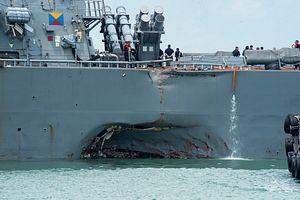As the anniversary of the USS Fitzgerald and USS John S. McCain’s deadly collisions last summer approaches, senior officers continue to face fallout from the tragedies.
USNI News reports that the secretary of the navy has recommended that the former three-star head of the Navy’s surface forces be retired at a lower rank, pending final approval by the secretary of defense. Vice Admiral Thomas Rowden oversaw the equipping, training, and maintenance of the U.S. Navy’s surface fleet, though not its operational employment, when the two collisions occurred. Seven sailors died on the USS Fitzgerald and 10 on the USS John S. McCain in collisions just two months apart in the Western Pacific last year.
Rowden requested an early retirement last fall after the collisions, but then left his post abruptly in January, just weeks before that planned early departure and retirement following recommendations by the four-star admiral charged with overseeing the disposition of investigations into the mishaps. His retirement had been pending final adjudication and approval by the secretary of the navy since then.
If Defense Secretary James Mattis concurs with Navy Secretary Richard Spencer’s reported determination, Rowden would retire at the two-star rank of rear admiral.
Reductions in rank are exceptionally rare in the U.S. military, particularly for such senior officers. They are usually the result of personal misconduct, such as when the former four-star head of U.S. Africa Command was stripped of a star following revelations of lavish travel and personal expenses charged to the government, or criminal prosecution, such as ex-Rear Admiral Robert Gilbeau, who was implicated for bribery in the Pacific Fleet’s far-reaching “Fat Leonard” corruption scandal.
Vice Admiral Joseph Aucoin, the overall operational commander of Japan-based ships like the Fitzgerald and McCain was relieved as commander of the U.S. 7th Fleet because of the collisions. His immediate superior, Admiral Scott Swift, the commander of U.S. Pacific Fleet, requested early retirement after being informed he would not be nominated to take over command of all U.S. forces in the Pacific, as had been widely expected.
Earlier this month, the captain of the USS John S. McCain, which collided with a merchant ship in the busy approaches to the Singapore Strait last August, pleaded guilty to a charge of negligence in a court martial. He had faced charges of dereliction of duty, hazarding a vessel, and negligent homicide. The court awarded him a punitive letter of reprimand, with forfeiture of $6,000 in pay. He will also request retirement, and like Rowden, could still face a reduction in his retired rank.
His counterpart on the USS Fitzgerald, which collided with a merchant ship in a busy sea lane south of Tokyo Bay last June, has stated that he will not seek or accept a plea deal, and intends to face similar charges of dereliction, hazarding a vessel, and negligent homicide at a court martial.
Unlike the captain of the McCain, he was in his stateroom and not on the bridge during the events leading up to the collision. He sustained injuries when the merchant ship’s bow ripped open his compartment, leaving him hanging on to the outside of the ship until he could be rescued by other members of the crew. The officers responsible for navigating the Fitzgerald that night failed to inform him of the dangerous situation that was developing as required. The officer in charge on the Fitzgerald’s bridge during the collision pleaded guilty to dereliction of duty in April, and some analysts speculate that military prosecutors will subsequently seek her testimony against the former captain.
































